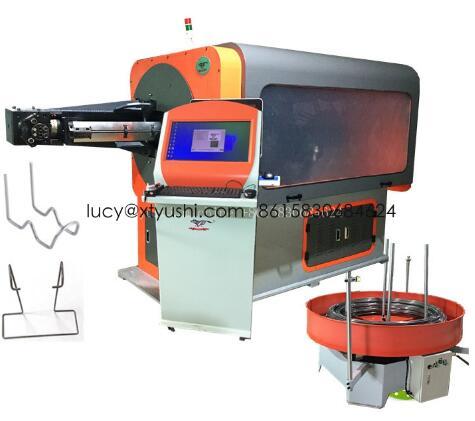What Types of Wire Can a Wire Bending Machine Handle?

Most machines can bend a variety of wire materials including steel, stainless steel, copper, brass, aluminum, depending on the machine's specifications and the wire diameter. Wire bending machines are indispensable in modern manufacturing, enabling the efficient and precise shaping of wires into countless forms for various industrial applications. These machines are not only versatile but also capable of handling a wide range of wire materials and diameters, making them a critical investment for industries like automotive, construction, electronics, and more. In this article, we will explore the types of wire that a wire bending machine can process, the considerations for choosing the right material, and why advanced equipment from companies like JUSHI is revolutionizing this sector.

Types of Wire Materials for Bending
Wire bending machines are engineered to accommodate diverse wire materials. Depending on the machine’s capabilities and specifications, the following wire types are commonly processed:
1. Steel Wire
Steel is one of the most widely used materials for wire bending. Its strength, durability, and versatility make it suitable for a wide range of applications:
- Mild Steel: Easy to bend and used in applications like wire racks, hooks, and light structural components.
- High-Carbon Steel: Ideal for heavy-duty applications like springs, brackets, and automotive components due to its strength and resistance to wear.
- Stainless Steel: Preferred for its corrosion resistance and aesthetic appeal, making it a popular choice for medical equipment, kitchen tools, and architectural designs.
2. Aluminum Wire
Aluminum is lightweight, corrosion-resistant, and easy to work with, making it an excellent choice for industries like aerospace, construction, and electronics. Wire bending machines handle aluminum wires effectively, ensuring precision in shaping without compromising the material’s integrity.
3. Copper Wire
Copper’s high conductivity and malleability make it essential in electrical and electronic industries. Wire bending machines can process copper wires for applications such as:
- Electrical connectors and components.
- Decorative elements in jewelry or art.
- Industrial machinery wiring.
4. Brass Wire
Brass, an alloy of copper and zinc, is known for its strength, corrosion resistance, and golden appearance. Wire bending machines are used to form brass wires into intricate shapes for:
- Plumbing and electrical fittings.
- Decorative fixtures.
- Musical instruments.
5. Alloy Wires
Specialty alloy wires, such as nickel-chromium, titanium, or Inconel, are used in high-performance applications, including aerospace, medical devices, and chemical processing. These materials require advanced wire bending machines capable of handling their unique properties.
Wire Sizes and Diameters
Wire bending machines are designed to process a wide range of wire diameters, from ultra-fine wires used in electronics to thick wires used in construction. The capability of a machine to handle specific diameters depends on its configuration and tooling. For example:
- Fine Wires (Below 1mm): Used in precision applications like medical devices and electronics.
- Standard Wires (1-10mm): Common in industries like automotive, furniture, and retail displays.
- Thick Wires (Above 10mm): Suitable for heavy-duty components in construction and industrial equipment.
Factors Affecting Wire Bending
While wire bending machines are versatile, certain factors can affect their performance and the types of wire they can handle:
- Wire Hardness and Ductility: Softer materials like aluminum and copper are easier to process, while harder materials like stainless steel require more robust machinery and tooling.
- Surface Coating: Coatings such as galvanization or insulation must remain intact during bending to maintain the wire’s functional properties.
- Machine Specifications: High-end machines with CNC controls can handle complex bending operations and minimize deformation.
- Tooling and Dies: Custom tooling ensures precision and consistency, regardless of the material.
Applications of Wire Bending Machines
The ability to process a variety of wire materials expands the applications of wire bending machines across multiple industries:
- Automotive: Production of seat frames, exhaust brackets, and suspension components.
- Construction: Bending rebar and steel wires for structural reinforcements.
- Furniture: Shaping frames and supports for chairs, tables, and storage units.
- Electronics: Creating wire forms for electrical connectors and enclosures.
- Retail Displays: Producing hooks, shelves, and grid walls for merchandising systems.
- Medical Devices: Forming precision components for surgical instruments and diagnostic equipment.
Why Choose JUSHI Wire Bending Machines?
With over a decade of expertise in manufacturing innovative industrial machinery, JUSHI has established itself as a leader in the wire bending industry. The company’s CNC wire bending machines are designed to handle a wide range of materials and diameters with exceptional precision. Whether you are working with fine copper wires or robust stainless steel, JUSHI machines deliver consistent quality, efficiency, and durability.
Market Insights
The global market for wire bending machines is projected to grow significantly in the coming years. According to recent industry reports, the demand for CNC-enabled machines is expected to rise by over 6% CAGR, driven by the increasing need for automation and precision in manufacturing. Companies investing in advanced equipment, like those offered by JUSHI, are well-positioned to capitalize on this trend.
Conclusion
Wire bending machines are a cornerstone of modern manufacturing, capable of processing a wide variety of wire materials with precision and efficiency. From steel and aluminum to copper and specialty alloys, these machines cater to the diverse needs of industries worldwide. By investing in high-performance equipment, such as those from JUSHI, manufacturers can achieve greater productivity, reduce waste, and deliver top-quality products to their customers.
Contact Us
E-mail :
Mobile/whatsapp/wechat::
Address:Xingjiawan Town Industrial Zone, Renze District, Xingtai City, Hebei Province.






